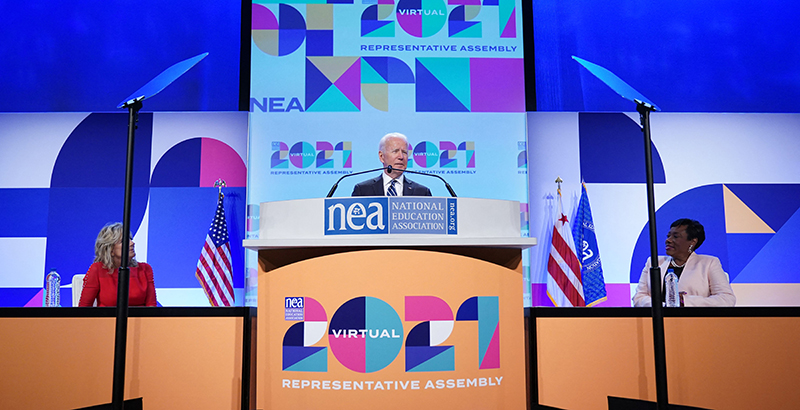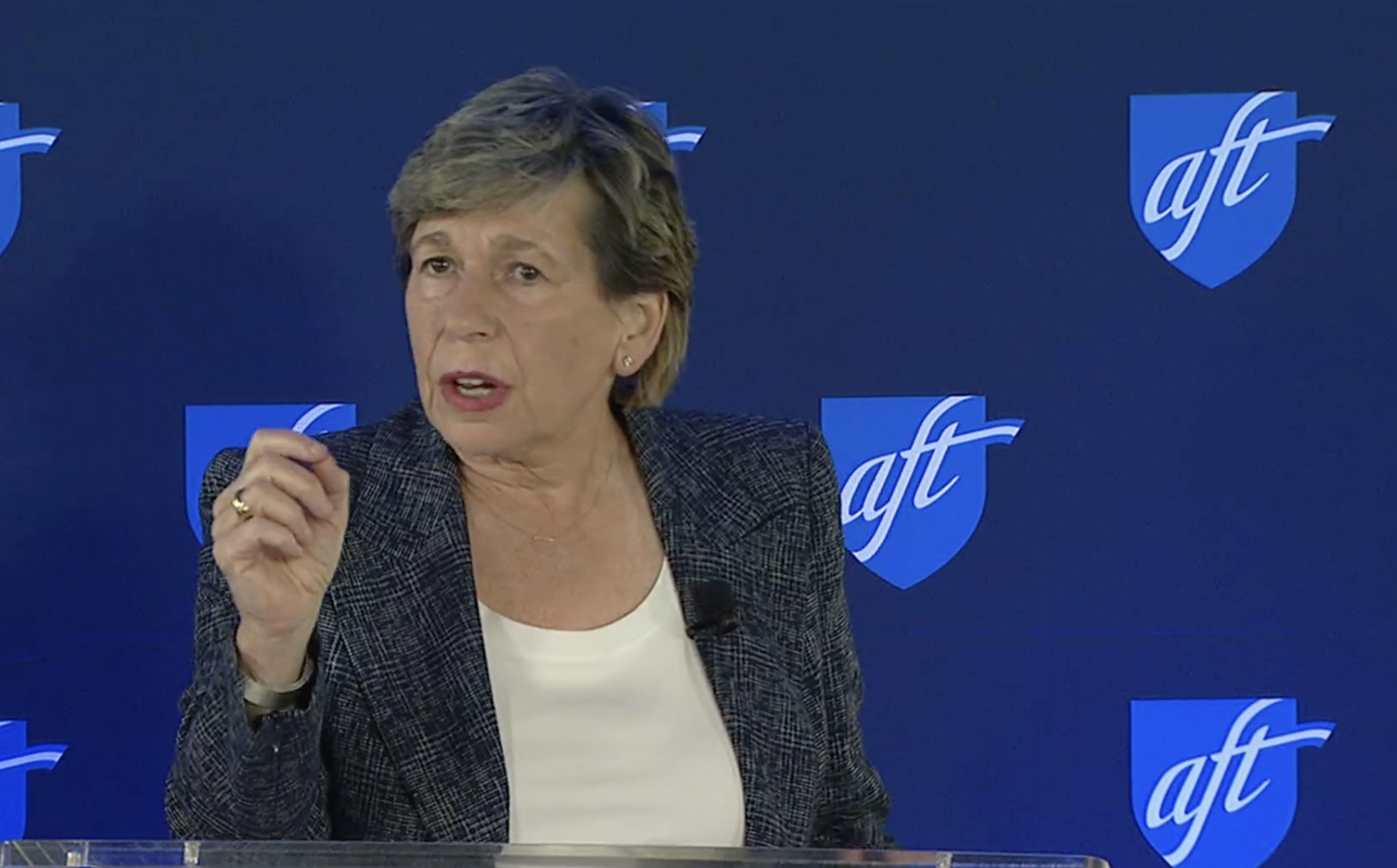Unions Go All-In on Critical Race Theory, Promising Money and Support to Members Teaching ‘Honest History’

Editor’s note appended
School district leaders might deny that they’re openly teaching critical race theory, but the nation’s largest teachers union is launching a campaign to have them do just that.
Delegates at the National Education Association’s annual meeting last week approved a statement calling for a campaign to implement the theory in curriculum and oppose efforts to ban it. Other items approved include researching organizations “attacking educators doing anti-racist work” and naming Oct. 14 — George Floyd’s birthday — as a national day dedicated to teaching about oppression and structural racism.
On Tuesday, the leader of the nation’s other major teachers union joined the fray. American Federation of Teachers president Randi Weingarten said critical race theory is not taught in schools, but pledged to back any teachers who address topics the laws seek to exclude from classroom conversations.
“Mark my words: Our union will defend any member who gets in trouble for teaching honest history. We have a legal defense fund ready to go,” she said at the opening of the union’s annual professional development conference. She added that “culture warriors want to deprive students of a robust understanding of our common history.”

It’s unclear whether the NEA is encouraging members in states that have already passed anti-critical race theory legislation to violate the law. At the very least, it is arguing that teachers shouldn’t gloss over “unpleasant aspects of American history” according to the union’s adopted statement.
The theory — bitterly dividing communities across the country — teaches that racism is an integral part of U.S. systems and institutions that purposely disadvantage people of color. The unions’ stance comes as nine states have already banned instruction that references structural racism, white supremacy and other key principles of the theory. More than 20 other states have considered similar bills.
The union was “forced to some extent” to enter the fray because of how volatile the debate has become, said Bradley Marianno, an assistant education professor at the University of Nevada, Las Vegas.
“Their members, particularly those who wish to instruct on elements of critical race theory, want to know that they have a union behind them if their jobs are jeopardized by their classroom instruction,” he said. “This is not a new role for teachers’ unions in the broadest terms but is also somewhat unique in that this one is tied so tightly to instruction informed by a single theory.”
Like the conflict over reopening schools, the clash over critical race theory is pitting parents who want a say in what schools teach against unions seeking to protect teachers’ autonomy, Marianno said, adding that they “will continue to butt heads throughout this school year.”
Weingarten, in fact, predicted that this coming school year could be even more challenging than the last.
“It won’t be easy, and some people will try to make it harder, like those who have disparaged educators, scapegoated our unions and blamed us for things outside our control, like school closures caused by a pandemic,” she said.
Marianno said the NEA’s action could be an effort to preempt any further bans on instruction related to critical race theory, but that the union has also “opened up the avenue for litigation” in the nine states with existing restrictions.
Not all teachers, however, agree with the focus on race and racial oppression in the classroom. The conservative Southeastern Legal Foundation is representing a Chicago-area teacher in a federal lawsuit, filed last week, that argues antiracist training for teachers and students is unconstitutional. Stacy Deemar, a middle school drama teacher, argues that the Evanston/Skokie School District 65 is violating prohibitions on discrimination by race, color or national origin. According to the lawsuit, the district has organized both teachers and students into racial “affinity groups” and required them to participate in “privilege walks” where they are segregated by color.
Meanwhile, teachers are receiving increasing support from civil rights groups, who are drawing comparisons between the current uproar over critical race theory and the struggles of the 1960s. One group, the Student Nonviolent Coordinating Committee Legacy Project, a nonprofit seeking to preserve the history of a student-led organization that participated in the civil rights movement, penned an open letter to teachers.
“We who resisted the laws of segregation by sitting at ‘White Only’ lunch counters, and organized voter registration campaigns among those historically denied the right to vote, stand now in support of those teachers and professors who today defy this new form of McCarthyism by pledging to continue writing, speaking, and teaching about systemic racism, structural inequality, and institutionalized white-supremacy past and present,” the letter said. “To all the courageous teachers who won’t back down from teaching their students the truth, we stand with you.”
Editor’s note: Reporting for this story was based partly on “business items” that the National Education Association passed at its annual meeting last week, but which no longer appear to be on the union’s website.
An item referring to critical race theory in curriculum appeared under New Business Item A prior to its approval and reads that the union will support and lead a campaign that results “in increasing the implementation of culturally responsive education, Critical Race Theory, and Ethnic (Native People, Asian, Black, Latin(o/a/x), Middle Eastern and North African, and Pacific Islander) Studies curriculum in Pre-K-12 and higher education.” The news of its passage also no longer appears to be on the union’s website, but was archived.
Get stories like these delivered straight to your inbox. Sign up for The 74 Newsletter


